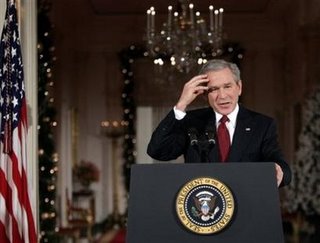
Today it comes to past that Bush broke federal law and has admitted to it on Saturday, Sunday and Monday.
He says he'll do it again and he doesn't give a damn about it.
This is a News report about how Bush didn't want the story leaked in the first place.
-MSNBC, AP
Bush’s Snoopgate
The president was so desperate to kill The New York Times’ eavesdropping story, he summoned the paper’s editor and publisher to the Oval Office. But it wasn’t just out of concern about national security.
Dec. 19, 2005 - Finally we have a Washington scandal that goes beyond sex,
corruption and political intrigue to big issues like security versus liberty and
the reasonable bounds of presidential power. President Bush came out swinging on
Snoopgate—he made it seem as if those who didn’t agree with him wanted to leave
us vulnerable to Al Qaeda—but it will not work. We’re seeing clearly now that
Bush thought 9/11 gave him license to act like a dictator, or in his own mind,
no doubt, like Abraham Lincoln during the Civil War.
No wonder Bush was so desperate that The New York Times not publish its
story on the National Security Agency eavesdropping on American citizens without
a warrant, in what lawyers outside the administration say is a clear violation
of the 1978 Foreign Intelligence Surveillance Act. I learned this week that on
December 6, Bush summoned Times publisher Arthur Sulzberger and executive editor
Bill Keller to the Oval Office in a futile attempt to talk them out of running
the story. The Times will not comment on the meeting, but one can only imagine
the president’s desperation.
The problem was not that the disclosures would
compromise national security, as Bush claimed at his press conference. His
comparison to the damaging pre-9/11 revelation of Osama bin Laden’s use of a
satellite phone, which caused bin Laden to change tactics, is fallacious; any
Americans with ties to Muslim extremists—in fact, all American Muslims,
period—have long since suspected that the U.S. government might be listening in
to their conversations. Bush claimed that “the fact that we are discussing this
program is helping the enemy.” But there is simply no evidence, or even
reasonable presumption, that this is so. And rather than the leaking being a
“shameful act,” it was the work of a patriot inside the government who was
trying to stop a presidential power grab.
No, Bush was desperate to keep the
Times from running this important story—which the paper had already inexplicably
held for a year—because he knew that it would reveal him as a law-breaker. He
insists he had “legal authority derived from the Constitution and congressional
resolution authorizing force.” But the Constitution explicitly requires the
president to obey the law. And the post 9/11 congressional resolution
authorizing “all necessary force” in fighting terrorism was made in clear
reference to military intervention. It did not scrap the Constitution and allow
the president to do whatever he pleased in any area in the name of fighting
terrorism.
What is especially perplexing about this story is that the 1978 law set up
a special court to approve eavesdropping in hours, even minutes, if necessary.
In fact, the law allows the government to eavesdrop on its own, then
retroactively justify it to the court, essentially obtaining a warrant after the
fact. Since 1979, the FISA court has approved tens of thousands of eavesdropping
requests and rejected only four. There was no indication the existing system was
slow—as the president seemed to claim in his press conference—or in any way
required extra-constitutional action.
This will all play out eventually in
congressional committees and in the United States Supreme Court. If the
Democrats regain control of Congress, there may even be articles of impeachment
introduced. Similar abuse of power was part of the impeachment charge brought
against Richard Nixon in 1974.
In the meantime, it is unlikely that Bush will
echo President Kennedy in 1961. After JFK managed to tone down a New York Times
story by Tad Szulc on the Bay of Pigs invasion, he confided to Times editor
Turner Catledge that he wished the paper had printed the whole story because it
might have spared him such a stunning defeat in Cuba.
This time, the
president knew publication would cause him great embarrassment and trouble for
the rest of his presidency. It was for that reason—and less out of genuine
concern about national security—that George W. Bush tried so hard to kill the
New York Times story.





0 comments:
Post a Comment